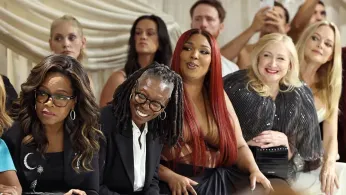
3 hours ago
Lizzo Shines in Sheer Bodysuit at New York Fashion Week, Sparking Conversations on Body Positivity and LGBTQ+ Visibility
READ TIME: 3 MIN.
Lizzo made a powerful entrance at Christian Siriano’s runway show for the designer's Spring/Summer 2026 collection, an event that was part of New York Fashion Week. Sitting front row, the acclaimed singer-songwriter and outspoken advocate for body positivity wore a daring corset bodysuit that was not only sheer, but paired with a black chiffon wrap skirt and strappy high-heeled sandals. The ensemble, both elegant and unapologetically bold, immediately drew attention from fellow attendees, photographers, and fashion commentators alike .
Lizzo, 37, was joined by an illustrious group of guests that included Whoopi Goldberg, Gayle King, and Oprah Winfrey, underscoring the event’s status as one of New York Fashion Week’s most anticipated shows. Her attendance, and especially her sartorial choice, became a focal point of discussion both within the fashion world and across social media platforms .
Lizzo’s appearance at the Siriano show is significant not only for its fashion merits but also for its broader cultural impact. The artist is widely recognized for using her platform to champion body diversity, LGBTQ+ rights, and mental health awareness. Her willingness to embrace sheer, form-fitting couture on a global stage directly challenges longstanding norms about which bodies are celebrated in fashion and media .
Speaking with Women's Health, Lizzo addressed her ongoing journey toward self-acceptance. “I like how I look now,” she stated. “I still think I’m big. I’m still wearing plus-size clothing. I have the same rolls. I got the same belly, the same thighs — I think I’m just a smaller version.” She continued, “Body positivity has nothing to do with staying the same. Body positivity is the radical act of daring to exist loudly and proudly in a society that told you you shouldn’t exist” .
The presence of queer allies and icons in the audience, such as Oprah Winfrey and Whoopi Goldberg, further highlighted the event’s intersectional celebration of diversity and inclusion. Siriano himself is known for his inclusive casting and commitment to dressing people of all sizes, genders, and backgrounds, making his show a natural fit for Lizzo’s bold self-expression .
Lizzo’s visibility at major cultural events like New York Fashion Week carries particular resonance for queer communities, where body image pressures and representation remain ongoing challenges. Her advocacy for body positivity and mental health aligns with the experiences of many queer individuals, who often face heightened scrutiny and marginalization based on appearance, gender expression, or size.
By taking up space in a sheer bodysuit—an outfit typically reserved for the most privileged bodies in fashion—Lizzo models a radical acceptance and joy that resonates with those who have historically been excluded from mainstream beauty standards. Her message of “existing loudly and proudly” aligns closely with core values of LGBTQ+ pride and resistance .
Lizzo’s New York Fashion Week appearance also reignited online conversations about body image and the scrutiny faced by public figures, particularly women and LGBTQ+ people of color. As Lizzo has documented her weight loss journey on social media, she has faced both praise and criticism, including speculation about the methods behind her transformation .
In her interview with Women's Health, Lizzo addressed some of the public’s speculation: “I use fitness to improve my mental health as well as my physical health,” she said, highlighting the intersection between mental wellness and body acceptance. She also pushed back against the idea that body positivity requires stasis, emphasizing personal growth and self-affirmation .






